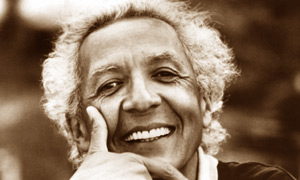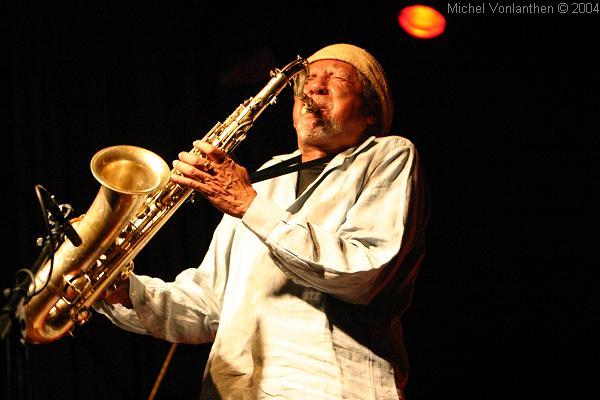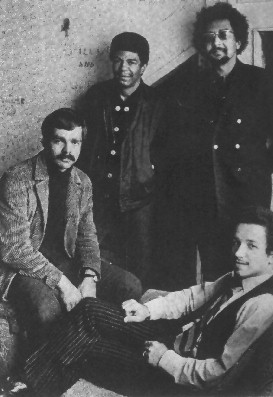CHARLES LLOYD / “Forest Flower (Sunset)”

I dream of a peaceful world. Music is the best means I have to work on that dream. Each time I have the opportunity to play, it is another chance to tell the truth. Life on the planet has come down to such an acute degree of ADD it is terrifying. We are constantly being bombarded from all directions with information - most of it useless that serves to bifurcate the mind. I am afraid that people are going to go from birth to death and never know they were here or why they were here.
—Charles Lloyd
Trane had A Love Supreme. Miles had Kind of Blue. Charles Lloyd. Forest Flower. One of the first jazz albums to sell a million. But the composition had been a hit before it became a best seller.
The money meant nothing to Lloyd. Three years later he split the scene. The fame? So what. What was he searching for? A life that only he could find. He was searching for how to be himself.
Charles Lloyd.
We met a number of times. Became friends. I was interviewing him once. We were supposed to talk for half an hour. Three hours later we were deep in conversation. At one point I asked him about legendary Memphis pianist Phineas Newborn.
Charles wept. Shed tears like any man does when Big Mama dies and he is helpless to help her. Helpless. As much as Big Mama did for him, the man can do nothing to save Big Mama. Many of us have a Big Mama. That’s how he wept.
Throughout the eighties when I was doing a lot of music production we would see each other at festivals and gigs. Once we happened to both be in Atlanta. He performing a free festival in Grant Park. I talked my way backstage. At that time I had a business card. Executive Director. New Orleans Jazz & Heritage Foundation. I didn’t have to say much.
We embraced.
Sometimes he would send me things. A poster. A recording. Charles Lloyd. A documentary. It’s been a minute but I never forget. How can I forget. The music is always there.
* * *
When I was in high school, I could walk down the street and hear "Forest Flower" waffing through the wood of old New Orleans shotgun houses. This was when Charles was with drummer Chico Hamilton's aggregation. The album was Hamilton's 1963 Man From Two Worlds on the new jazz label Impulse. This is one of the great jazz albums of that year—or, for that matter, any adjacent or nearby year. The seventies, a decade that had greatness after greatness after greatness jumping at you, filling the air like musical incense. Nevertheless, as high as the bar was, these two versions of "Forest Flower" easily clear the crossbar with at least a foot or two to spare. BTW, if you are a jazzhead and do not know this album, you're missing at least one ear.
Charles Lloyd was Chico's musical director and chief composer. I believe Lloyd authored every cut on the Two Worlds release. Albert Stintson on bass and Gabor Szabor on guitar. That version with the definitive drum pick-up. Instead of opening with a straight press roll, Chico dropped a slamming two count. And that groove. A cross between a bossa nova and a blues shuffle. I can hear the first three seconds of the song and I am back in the mid-sixties. Walking down London Avenue. The sun is shinning. I am singing with the sax. Charles Lloyd.

“Forest Flower” is such a great composition. Sunrise—the opening. The piece bills, blossoms. Sunset—the groove gets deeper. Bluesy. Goes to funk. In a jazz way. Anybody at that time who thought of themselves as hip, or who aspired to that beatific state, we all knew and loved “Forest Flower.”
But of course, of course. (Which BTW was the title of a 1965 Charles Lloyd recording. That phrase was a way of affirming the obvious. “Man you’re going to make the set?” “Of course, of course.”)
I was there in 1964, maybe it was late ’63, when Cannonball and Nancy Wilson played the Loyola Field House. Charles Lloyd was in the band. Lloyd was in my ear. He had his horn on my spirit. I see him now. Tall. Leaning against a wall. I would say looking silent and inscrutable but that would be an understatement. I wasn’t even sure he was breathing. Maybe he was auditioning to be a Buddha.
Those were my formative years in the music and Charles Lloyd. Of course, of course. I would listen to Man From Two Worlds for hours.
And then came the 1966 recording on Atlantic, Forest Flower. By then I was in the military. But I kept up on it. “It” being the jazz scene. That record set a standard. Lloyd was filling stadiums. The first jazz musician to play the Filmore. When he retired Miles snatched up Keith Jarrett and Jack DeJohnette. Squares think Miles started fusion.

(Clockwise from the left: Ron McClure, Jack DeJohnette, Charles Lloyd, Keith Jarrett)
Listen to the Atlantic recording. “Forest Flower” is now a full blown suite. Fully sweet. Everything at a serious pitch. Serious fun. Serious seriousness. Incadescent. Four spirits rising. Cecil McBee dropping those awesome bass lines (he would later be replaced by Ron McClure) and DeJohnette turning out the drum kit. And Charles Lloyd with that softly roaring sound of his. Ferociously tender.
Compare DeJohnette’s drum solo to Hamilton’s. Chico is masterful. Plays with the control and technique of a professional at the top of his game. But my man Jack just lets it all go. Spills his guts on the skins and hammers away until we and he are exhausted. Keith Jarrett does some of that Cecil Taylor channeling. CT was and (semi-quiet as it’s kept) remains the avatar of “out” piano music. Check how at the end of the song Keith Jarrett has one hand inside the piano, dampening the keys to get that muted sound. That’s how it was in those days. You played your whole instrument, even the parts that others never thought of playing.
“Forest Flower” was so funky and in turns so lyrical and in turns so “out.” It was everything. The whole life cycle in one song.
That was September of 1966. Within a year Trane would be gone and while a host of others tried to carry on, no one really did. Not even Pharoah. They all did what they did and it was great and greatly appreciated. But, you know, Trane. And then Lloyd goes into retirement. But there was so much happening, so much music on the scene, we didn’t fully miss it. Didn’t know what all we were missing until Lloyd got back and blew us all away with the mysticism of his music.
He was about love. We had been at war.
Not until the eighties. 1983 when the Blue Note album A Night in Copenhagen came out. Not til then did we fully recover the Charles Lloyd spirit sound.
In the interim we had the recordings. Especially “Forest Flower.”
Hopefully I have adequately indicated that this is not merely music. This is my life. A map of my maturing.
The flower still blossoms.
Thank you, Charles Lloyd.
—Kalamu ya Salaam
Spiritual jazz
Almost from the beginning, I knew I was going to need Kalamu's write-up to make sense of these tunes. Not because I couldn't hear them. I heard them fine. But I didn't know much about either Charles Lloyd or Chico Hamilton aside from recognizing their names. I don't know the significance of their styles. I don't know who their influences were and I don't know who'd been influenced by them. To be honest (and I probably shouldn't admit this but I'm going to anyway), I thought Chico Hamilton was a piano player. The point is, without the write-up, I heard nothing more than a decent, swinging jazz tune.
But then I read the write-up. Reading it helped me to understand some of the historical context of the record. It helped me to understand what the record meant not just to Kalamu but to the sixties-era jazzheads in general. I can relate to that. There are hip-hop records that meant so much to me and mine that are virtually unknown nowadays, even among those who fancy themselves "heads." This type of thing is what I hope BoL does: I hope it gives people a doorway, a portal into the house of music. I hope it helps people to listen with different ears, just like this week's write-up on Charles Lloyd helped me to listen with different ears. Sometimes, you have to know what you're supposed to be hearing before you can actually, really hear it.
When I first heard these tunes, I thought they were OK, but I probably wouldn't have made it through to the end without reading Kalamu's words. But now that I have, I've listened to "Forest Flower" (I particularly like the live "Sunrise" version) a few times and it's definitely something I'll be adding to the 'Spiritual Jazz' mix in my iTunes. Maybe some other folk out there who've never heard Charles Lloyd or Chico Hamilton play will dig these tunes too.
—Mtume ya Salaam
This entry was posted on Monday, February 25th, 2008 at 1:39 am and is filed under Classic. You can follow any responses to this entry through the RSS 2.0 feed. You can leave a response, or trackback from your own site.
3 Responses to “CHARLES LLOYD / “Forest Flower (Sunset)””
March 1st, 2008 at 11:08 am
Lovely post, lovely music.
Have you heard Lloyd’s most recent ensemble ‘Sangam’ with Zakir Hussain? It’s like an Afro-American-Indo-free mashup with Lloyd still playing hard. He’s still got it and probably always will.
August 1st, 2009 at 2:37 pm
You have touched my spirit with your music. No greater language can be spoken than the sound of spirit filled music. Thank you
Leave a Reply
| top |